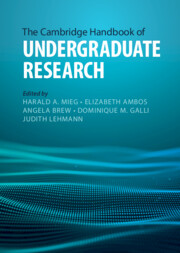Book contents
- The Cambridge Handbook of Undergraduate Research
- The Cambridge Handbook of Undergraduate Research
- Copyright page
- Contents
- Figures
- Tables
- Contributors
- Foreword
- Foreword
- 1 Introduction
- Part I Theory and Research on Undergraduate Research
- Part II Implementation, Approaches, Methods
- Part III Disciplines
- 17 Introduction
- Part III.1 STEM
- Part III.2 Health
- Part III.3 Social Sciences
- 28 Undergraduate Research in Sociology
- 29 Undergraduate Research in Psychology
- 30 Undergraduate Research in Economics
- 31 Undergraduate Research in Political Science
- Part III.4 Humanities
- Part III.5 Arts & Design
- Part III.6 Disciplines A–Z
- Part IV International Perspective
- Part V Avenues for Developing Undergraduate Research
- Index
- References
28 - Undergraduate Research in Sociology
Cultivating the Sociological Imagination
from Part III.3 - Social Sciences
Published online by Cambridge University Press: 11 August 2022
- The Cambridge Handbook of Undergraduate Research
- The Cambridge Handbook of Undergraduate Research
- Copyright page
- Contents
- Figures
- Tables
- Contributors
- Foreword
- Foreword
- 1 Introduction
- Part I Theory and Research on Undergraduate Research
- Part II Implementation, Approaches, Methods
- Part III Disciplines
- 17 Introduction
- Part III.1 STEM
- Part III.2 Health
- Part III.3 Social Sciences
- 28 Undergraduate Research in Sociology
- 29 Undergraduate Research in Psychology
- 30 Undergraduate Research in Economics
- 31 Undergraduate Research in Political Science
- Part III.4 Humanities
- Part III.5 Arts & Design
- Part III.6 Disciplines A–Z
- Part IV International Perspective
- Part V Avenues for Developing Undergraduate Research
- Index
- References
Summary
The development of the sociological imagination is central to undergraduate training in sociology. Undergraduate research experiences (UREs) are one powerful pedagogical approach to helping students critically observe and analyze the complexity of social life. This chapter (1) explores the roots of UREs insociology; (2) examines the literature on infusing and scaffolding course-based undergraduate research experiences (CUREs), attending to successful models implementing CUREs in several types of sociology courses, across the curriculum, and as an integrated departmental approach; (3) details benefits and challenges of implementing CUREs from various stakeholder perspectives, and (4) shares thoughts on the path forward to further infuse undergraduate research in the sociology curriculum.
Keywords
- Type
- Chapter
- Information
- The Cambridge Handbook of Undergraduate Research , pp. 277 - 284Publisher: Cambridge University PressPrint publication year: 2022



